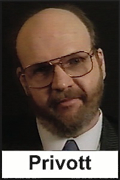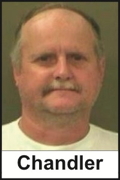Rascals case in brief
In the beginning, in 1989, more than 90 children at the Little Rascals Day Care Center in Edenton, North Carolina, accused a total of 20 adults with 429 instances of sexual abuse over a three-year period. It may have all begun with one parent’s complaint about punishment given her child.
Among the alleged perpetrators: the sheriff and mayor. But prosecutors would charge only Robin Byrum, Darlene Harris, Elizabeth “Betsy” Kelly, Robert “Bob” Kelly, Willard Scott Privott, Shelley Stone and Dawn Wilson – the Edenton 7.
Along with sodomy and beatings, allegations included a baby killed with a handgun, a child being hung upside down from a tree and being set on fire and countless other fantastic incidents involving spaceships, hot air balloons, pirate ships and trained sharks.
By the time prosecutors dropped the last charges in 1997, Little Rascals had become North Carolina’s longest and most costly criminal trial. Prosecutors kept defendants jailed in hopes at least one would turn against their supposed co-conspirators. Remarkably, none did. Another shameful record: Five defendants had to wait longer to face their accusers in court than anyone else in North Carolina history.
Between 1991 and 1997, Ofra Bikel produced three extraordinary episodes on the Little Rascals case for the PBS series “Frontline.” Although “Innocence Lost” did not deter prosecutors, it exposed their tactics and fostered nationwide skepticism and dismay.
With each passing year, the absurdity of the Little Rascals charges has become more obvious. But no admission of error has ever come from prosecutors, police, interviewers or parents. This site is devoted to the issues raised by this case.
On Facebook
Click for earlier Facebook posts archived on this site
Click to go to
Today’s random selection from the Little Rascals Day Care archives….
Click for earlier Facebook posts archived on this site
Click to go to
Today’s random selection from the Little Rascals Day Care archives….
Sheriff, mayor escaped prosecutors’ dragnet
May 22, 2013
“One of the biggest strengths for the prosecution was that these children would go home every night to a parent or parents fully aligned with the prosecution theory. The story line would be reinforced at dinner, bathtime, playtime, bedtime….
“The children were, of course, separated from further contact with the accused day care workers, and by the time of trial their young memories of the actual person had been replaced by the fictional person, if they could remember who the perpetrators were supposed to be at all.
“At one point, a Little Rascals child pointed to a picture of the sheriff as one of the defendants; this identification, of course, was selectively ignored.”
– From “The Metanarrative of Suspicion in Late Twentieth-Century America” by Sandra Baringer (2004)
Edenton’s mayor was also among the initially accused, who numbered either 20, 24 or “dozens,” depending on the source. The inevitable question: How did prosecutors come to choose the Edenton Seven? Who lucked out – and why?
Therapists, don’t commingle your forensic, therapeutic roles

Kirk
June 18, 2018
“Ted Cross, a senior research specialist at the University of Illinois School of Social Work, [said] separation of the two interventions – forensic and therapeutic – is critical for the child, but is also important for practical reasons: ‘You don’t want the therapeutic work to taint a criminal investigation. If a child is in therapy at the same time that the forensic interview takes place, the attorney representing the offender can say the therapist planted the idea of abuse in the child’s head.’.
“This point is of particular importance in the wake of high-profile cases such as the McMartin Preschool trial during the 1980s, in which therapists’ interviewing techniques were so suggestive that the children falsely accused their teachers of abuse….”
– From “How to Build a Space to Support Abused Children” by Mimi Kirk at Atlantic Cities (March 29)
Did the Little Rascals therapists offer children any therapy at all? What do you think?
![]()
Among the costs of incarceration: a marriage
Jan. 9, 2012
Perhaps the most inexplicable of the prosecution’s targets was 40-year-old Scott Privott, owner of an Edenton video store and shoe repair shop.
Son of a district court judge, he served as president of the local country club. No evidence ever surfaced to support the rumor that Privott’s video store was a hub for child pornography or to counter his claim never to have even set foot on the Little Rascals premises. According to the prosecution, children at the day care identified him as a perpetrator.
 In April 1993 his bail was reduced from $1 million to $50,000, and he was released on bond from Chowan County Jail. Fourteen months later, Privott accepted the state’s offer of a plea of no contest, still insisting on his innocence, and received a sentence of time served with an additional five years probation.
In April 1993 his bail was reduced from $1 million to $50,000, and he was released on bond from Chowan County Jail. Fourteen months later, Privott accepted the state’s offer of a plea of no contest, still insisting on his innocence, and received a sentence of time served with an additional five years probation.
He says he has been happily married for 14 years and doesn’t want to reveal where he now lives. I asked him to share some recollections about the case:
“Bob and I were more acquaintances than close friends. I played golf with him when he was the pro. Bob rented movies from my store, and he and many others would come by and have coffee and just talk. In fact, many of the accusing parents rented movies from me. (Bob Kelly suspects Privott may have been drawn into the case when Kelly’s truck was seen parked in front of the video store.)….
“In jail I spent the time reading and watching TV. We weren’t allowed newspapers, so I wasn’t sure what was being written about the case…. At times it was hard to keep my spirits up. I had gallbladder surgery and recuped at Central Prison in Raleigh and at McCain (Correctional Hospital in Raeford, closed in 2010)….
“Jail had just a walled-in area for outside activity, but at McCain I enjoyed being able to walk around the yard with others awaiting trial…I was in “safekeeping” and actually met some intelligent, thoughtful people. I never had any problems, as the majority knew the entire LRDC case was a farce….
“My wife came on Sundays, but as the years rolled on the visits were less and less, and then I noted a change I had been kind of expecting. She brought my mother with her, and in the later years she stood back and kind of let the visits be between mother and son. It turned out she had met someone new in her life. She didn’t have the nerve to tell me, but I figured it out….”
Junior Chandler wasn’t asking for much, but got nothing
 Feb. 4, 2013
Feb. 4, 2013
Junior Chandler, writing from Avery-Mitchell Correctional Center, January 23, 2013:
“All of the high profile and high publicity cases in the last 20 years – nearly every one of those people are home…. Except for me and I am still in prison…. April 15, 2013, will be 26 years.
“I know it’s extremely hard to get help to prove my innocence when there isn’t a crime committed to begin with.
“It doesn’t look like I got any help from Gov. Perdue when she left office, as I haven’t heard from anyone, nor has my time (sentence) changed any. All I was asking was time served or my time to be run concurrent instead of back to back, as my record on the street before and my record in here should mean something….
“But I guess it don’t matter – as I’ve seen people continually be in trouble (but) make honor grade and get out and then come right back in prison!
“Well, I’ll close for now. Maybe someone will be able to help get the truth out!”
Junior’s hopes for release now lie with North Carolina Prisoner Legal Services, which is deciding whether to take on his case.











0 CommentsComment on Facebook